
Shownotes
Wisdom-Trek / Creating a Legacy
Welcome to Day 953 of our Wisdom-Trek, and thank you for joining me.
This is Guthrie Chamberlain, Your Guide to Wisdom
The Enneagram System – Type Number One – The Reformer – Ask Gramps
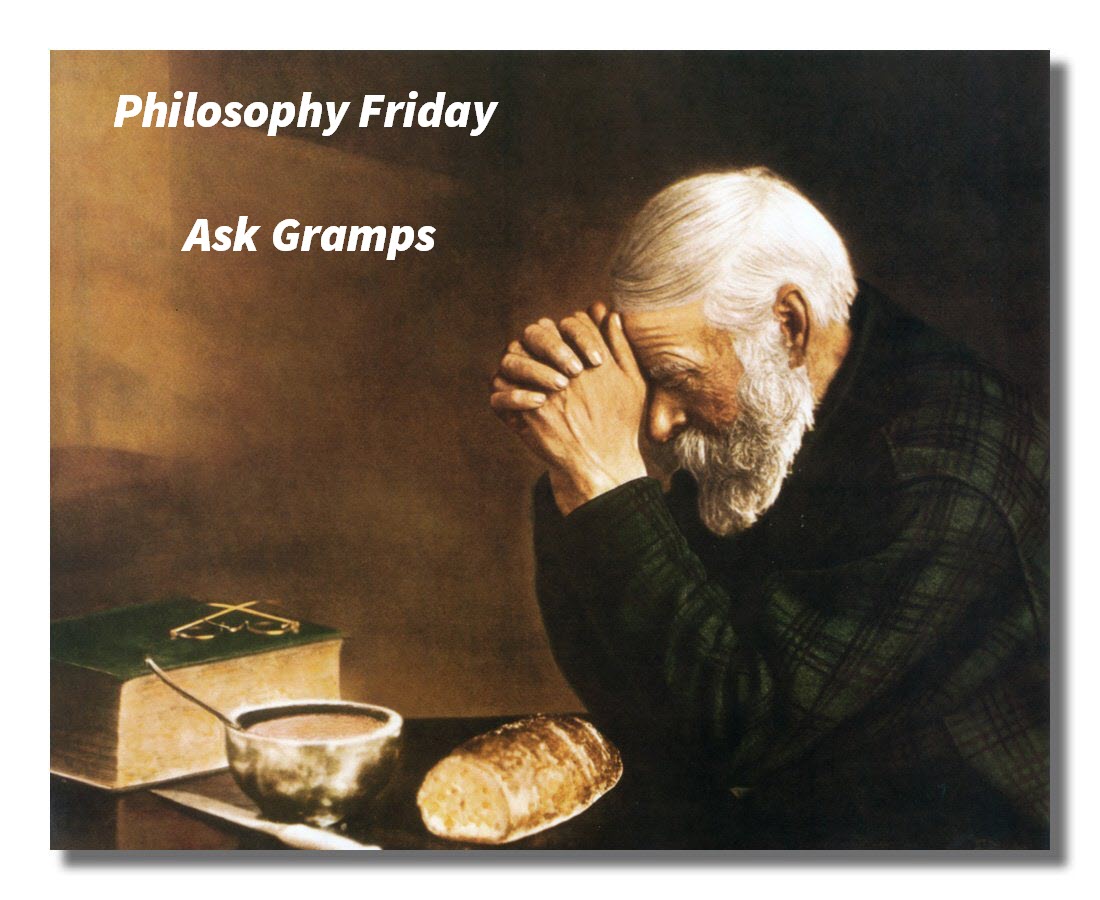
Thank you for joining us for our five days per week wisdom and legacy building podcast. We are broadcasting from our studio at The Big House in Marietta, Ohio. This is Day 953 of our trek, and it is time for our Philosophy Friday series.
Each Friday we ponder some of the basic truths and mysteries of life and how they impact us in creating our living legacy. As we continue on this trek called life, sometimes we have questions about life, so our Friday trek is a time when we can “Ask Gramps.” Gramps will answer questions that you would like to ask your dad or granddad, but for whatever reason are unable to. No matter how old we are, I know that all of us would like the opportunity to ask Dad or Gramps questions about life in many areas.
Today is the eighth episode in our series delving into what makes each of us respond to life situations and circumstances the way we do. Understanding ourselves and how others may interpret life through their paradigm will allow us to interact with each other with more love and compassion. This empathy can be achieved by utilizing a profound tool call “The Enneagram.” If you have missed any of our past seven Friday series, I would recommend going back and listening to them or reading the Wisdom Journals.
As a review, the tool that we refer to as the Enneagram (Any-a-Gram) is a circle with nine interconnected points (Ennea refers to 9 and Gram refers to a drawing). Check out today’s and the prior weeks’ Wisdom Journals for a representation of it. I have also included a copy of “The Enneagram At-A-Glance,” which was compiled by Suzanne H. Eller, in today’s Wisdom Journal. If you would like a PDF copy, click on the link in today’s Wisdom Journal located on our website Wisdom-Trek.com.
I would also recommend the book The Road Back to You written by Ian Morgan Cron and Suzanne Stabile. It is an excellent book about an enneagram journey to self-discovery from a Christian perspective.
In the first seven episodes, we explored how The Enneagram System works and then presented an overview of all nine personality types. On today’s trek, we will take a deep dive into type number One, which is referred to as “The Reformer.” Next week we will continue with type number Two, “The Helper.”
Since we are exploring this tool in detail, I would also recommend reading the Wisdom Journal for each Friday to see the diagrams presented each week. As helpful as the Enneagram is, keep in mind, though, it is still only a tool, and cannot replace or usurp the precepts that are found in God’s Word. All decisions and actions that we make in life must be in harmony with God’s precepts.
So the questions for the next several months will be…
“Hey, Gramps, why do people act and react to situations and circumstances in life differently? How can I gain wisdom to better understand myself and others so that I can love, serve, and minister to them on a deeper level?”
The Enneagram System – Type Number One – The Reformer
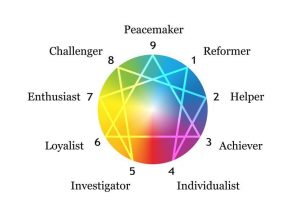
1 – THE REFORMER
Enneagram Type One
- The Rational, Idealistic Type:
Principled, Purposeful, Self-controlled, and Perfectionistic
· Type One in Brief
Ones are conscientious and ethical, with a strong sense of right and wrong. They are teachers, crusaders, and advocates for change: always striving to improve things, but afraid of making a mistake. Well-organized, orderly, and fastidious, they try to maintain high standards, but can slip into being critical of themselves and others and are perfectionistic. They typically have problems with resentment and impatience. At their best: wise, discerning, realistic, and noble. Can be morally heroic.
- Basic Fear: Of being corrupt/evil, defective
- Basic Desire: To be good, to have integrity, to be balanced
- Enneagram One with a Nine-Wing: “The Idealist”
- Enneagram One with a Two-Wing: “The Advocate”
Key Motivations: Want to be right, to strive higher and improve everything, to be consistent with their ideals, to justify themselves, to be beyond criticism so as not to be condemned by anyone.
- The Meaning of the Arrows (in brief)
When moving in their Direction of Disintegration (stress), methodical Ones suddenly become moody and irrational at Four. However, when moving in their Direction of Integration (growth), angry and critical Ones become more spontaneous and joyful, like healthy Sevens.
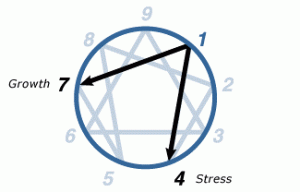
· Type One Overview
We have named personality type One The Reformer because Ones have a “sense of mission” that leads them to want to improve the world in various ways, using whatever degree of influence they have. They strive to overcome adversity—particularly moral adversity—so that the human spirit can shine through and make a difference. They strive after “higher values,” even at the cost of great personal sacrifice.
History is full of Ones who have left comfortable lives to do something extraordinary because they felt that something higher was calling them. During the Second World War, Raoul Wallenburg left a comfortable middle-class life to work for the protection of thousands of European Jews from invading Nazis. In India, Gandhi left behind his wife and family and life as a successful lawyer to become an itinerant advocate of Indian independence and non-violent social changes. Joan of Arc left her village in France to restore the throne to the Dauphin and to expel the English from the country. The idealism of each of these Ones has inspired millions.
Ones are people of practical action—they wish to be useful in the best sense of the word. On some level of consciousness, they feel that they “have a mission” to fulfill in life, if only to try their best to reduce the disorder they see in their environment.
Although Ones have a strong sense of purpose, they also typically feel that they have to justify their actions to themselves, and often to others as well. This orientation causes Ones to invest a lot of time thinking about the consequences of their actions, as well as about how to keep from acting contrary to their convictions. Because of this, Ones often persuade themselves that they are “head” types, rationalists who proceed only on logic and objective truth. But, the real picture is somewhat different. Ones are actually activists who are searching for an acceptable rationale for what they feel they must do. They are people of instinct and passion who use convictions and judgments to control and direct themselves and their actions.
In the effort to stay true to their principles, Ones resist being affected by their instinctual drives, consciously not giving in to them or expressing them too freely. The result is a personality type that has problems with repression, resistance, and aggression. They are usually seen by others as highly self- controlled, even rigid, although this is not how Ones experience themselves. It seems to them that they are sitting on a cauldron of passions and desires, and they had better “keep the lid on” lest they and everyone else around them regret it.
Cassandra is a therapist in a private practice who recalls the difficulty this caused her in her youth.
“I remember in high school getting feedback that I had no feelings. Inside, I felt my feelings intensely, and yet I just couldn’t let them out as intensely as I felt them. Even now, if I have a conflict with a friend and need to address an issue, I rehearse ahead of time how to express clearly what I want, need, and observe, and yet not be harsh or blaming in my anger which is often scathing.”
Ones believe that being strict with themselves (and eventually becoming “perfect”) will justify them in their own eyes and in the eyes of others. But by attempting to create their own brand of perfection, they often create their own personal hell. Instead of agreeing with the statement in Genesis that God saw what He had created, “and it was good,” Ones intensely feel that “It wasn’t—there obviously have been some mistakes here!”
This orientation makes it difficult for them to trust their inner guidance—indeed, to trust life—so Ones come to rely heavily on their superego, a learned voice from their childhood, to guide them toward “the greater good,” which they so passionately seek. When Ones have gotten completely entranced in their personality, there is little distinction between them and this severe, unforgiving voice. Separating from it and seeing its genuine strengths and limitations is what growth for Ones is about.
· Type One—Levels of Development
Healthy Levels
Level 1 (At Their Best): Become extraordinarily wise and discerning. By accepting what is, they become transcendentally realistic, knowing the best action to take in each moment. Humane, inspiring, and hopeful: the truth will be heard.
Level 2: Conscientious with strong personal convictions; they have an intense sense of right and wrong, personal religious and moral values. Wish to be rational, reasonable, self-disciplined, mature, moderate in all things.
Level 3: Extremely principled, always want to be fair, objective, and ethical: truth and primary justice values. The sense of responsibility, personal integrity, and of having a higher purpose often make them teachers and witnesses to the truth.
Average Levels
Level 4: Dissatisfied with reality, they become high-minded idealists, feeling that it is up to them to improve everything: crusaders, advocates, critics. Into “causes” and explaining to others how things “ought” to be.
Level 5: Afraid of making a mistake: everything must be consistent with their ideals. Become orderly and well-organized, but impersonal, puritanical, emotionally constricted, rigidly keeping their feelings and impulses in check. Often workaholics—”anal-compulsive,” punctual, pedantic, and fastidious.
Level 6: Highly critical both of self and others: picky, judgmental, perfectionistic. Very opinionated about everything: correcting people and badgering them to “do the right thing”—as they see it. Impatient, never satisfied with anything unless it is done according to their prescriptions. Moralizing, scolding, abrasive, and indignantly angry.
Unhealthy Levels
Level 7: Can be highly dogmatic, self-righteous, intolerant, and inflexible. Begin dealing in absolutes: they alone know “The Truth.” Everyone else is wrong: very severe in judgments, while rationalizing own actions.
Level 8: Become obsessive about imperfection and the wrongdoing of others, although they may fall into contradictory actions, hypocritically doing the opposite of what they preach.
Level 9: Become condemnatory toward others, punitive and cruel to rid themselves of wrongdoers. Severe depressions, nervous breakdowns, and suicide attempts are likely. Generally corresponds to the Obsessive-Compulsive and Depressive personality disorders.
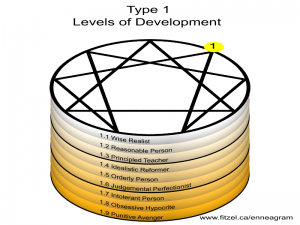
· Personal Growth Recommendations for Enneagram Type Ones
- Learn to relax. Take some time for yourself, without feeling that everything is up to you or that what you do not accomplish will result in chaos and disaster. Mercifully, the salvation of the world does not depend on you alone, even though you may sometimes feel it does.
- You have a lot to teach others and are probably a good teacher, but do not expect others to change immediately. What is obvious to you may not be as obvious to them, especially if they are not used to being as self-disciplined and objective about themselves as you are about yourself. Many people may also want to do what is right and may agree with you in principle but for various reasons simply cannot change right away. The fact that others do not change immediately according to your prescriptions does not mean that they will not change sometime in the future. Your words and above all, your example may do more good than you realize, although they may take longer than you expect. So have patience.
- It is easy for you to work yourself up into a lather about the wrongdoings of others. And it may sometimes be true that they are wrong. But what is it to you? Your irritation with them will do nothing to help them see another way of being. Similarly, beware of your constant irritation with your own “shortcomings.” Does your own harsh self-criticism really help you to improve? Or does it simply make you tense, nervous, and self-doubting? Learn to recognize the attacks of your superego and how they undermine rather than help you.
- It is important for you to get in touch with your feelings, particularly your unconscious impulses. You may find that you are uneasy with your emotions and your sexual and aggressive impulses—in short, with the messy human things that make us human. It might be beneficial to keep a journal or to get into some kind of group therapy or other group work both to develop your emotions and to see that others will not condemn you for having human needs and limitations.
- Your Achilles’ heel is your self-righteous anger. You get angry easily and are offended by what seems to you to be the perverse refusal of others to do the right thing—as you have defined it. Try to step back and see that your anger alienates people so that they cannot hear many of the good things you have to say. Further, your own repressed anger may well be giving you an ulcer or high blood pressure and is a harbinger of worse things to come.
That will conclude our focus on personality type number one – The Reformer. A word of encouragement for those of you who are Enneagram type number one from God’s word. You will never be perfect on this side of eternity, do your best, but allow for God’s grace. 1 Corinthians 13:12 reminds, “Now we see things imperfectly, like puzzling reflections in a mirror, but then we will see everything with perfect clarity.[a] All that I know now is partial and incomplete, but then I will know everything completely, just as God now knows me completely.”
Join us again next Friday as we further explore the Enneagram on our “Ask Gramps” episode. We will specifically explore Enneagram Number Two – The Helper in depth. The information that we explore will allow you to unlock who you are as we travel on our trek of life and discover more about yourself and others as you impact God’s kingdom. I know you will find these insights interesting, practical, and profitable in living a rich and satisfying life.
Our next trek is Mediation Monday where we will help you reflect on what is most important in life. So encourage your friends and family to join us and then come along on Monday for another day of our Wisdom-Trek, Creating a Legacy.
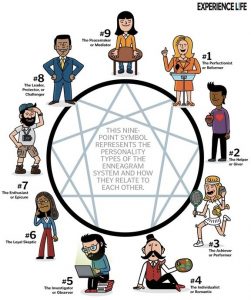
If you would like to listen to...